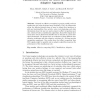Free Online Productivity Tools
i2Speak
i2Symbol
i2OCR
iTex2Img
iWeb2Print
iWeb2Shot
i2Type
iPdf2Split
iPdf2Merge
i2Bopomofo
i2Arabic
i2Style
i2Image
i2PDF
iLatex2Rtf
Sci2ools
121
click to vote
AUSAI
2009
Springer
2009
Springer
Classification of EEG for Affect Recognition: An Adaptive Approach
Research on affective computing is growing rapidly and new applications are being developed more frequently. They use information about the affective/mental states of users to adapt their interfaces or add new functionalities. Face activity, voice, text physiology and other information about the user are used as input to affect recognition modules, which are built as classification algorithms. Brain EEG signals have rarely been used to build such classifiers due to the lack of a clear theoretical framework. We present here an evaluation of three different classification techniques and their adaptive variations of a 10-class emotion recognition experiment. Our results show that affect recognition from EEG signals might be possible and an adaptive algorithm improves the performance of the classification task. Key words: Affective computing, EEG, Classification, Adaptive
Related Content
| Added | 12 Aug 2010 |
| Updated | 12 Aug 2010 |
| Type | Conference |
| Year | 2009 |
| Where | AUSAI |
| Authors | Omar AlZoubi, Rafael A. Calvo, Ronald H. Stevens |
Comments (0)

